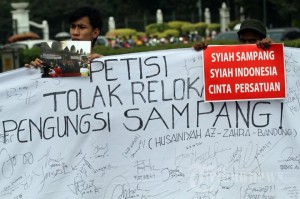With a population of around 250 million characterized by high ethnic and religious diversity, Indonesia has been facing the difficult challenge of maintaining peaceful and harmonious co-existence between followers of different faiths. In some instances, religious minority communities have been chased away from their homes.
After a conflict with an anti-Shiite group in August 2012, Syafii (not his real name), a Shiite Muslim student, was forced to flee his village Sampang, East Java, together with his community consisting of 72 families. Since then, Syafii has been advocating for the plight of his community, who have been living in a camp for almost two years. In order to make their voices heard, he joined Sahabat KBB, a national advocacy coalition made up of Human Rights Defenders all of whom are former victims of violations of the right to Freedom of Religion and Belief (FoRB). Working together with stakeholders from the local and national government, civil society, and communities, Syafii has been advocating for the return of his community and reconciliation with the other communities in Sampang.
In July 2013 a government reconciliation team was set up to address the problems faced by the relocated community. However, little progress has been achieved so far and the approach taken displays a lack of understanding of the right to FoRB. The team suggested for example, that as a precondition to reconciliation with the Sunni majority in the country, Shiites should disband themselves and convert to the majority Sunni strain of Islam. Needless to say, this suggestion was rejected by Shiites and criticized by non-governmental organizations and moderate religious leaders as violating the Constitution of Indonesia, which guarantees the right to FoRB.
Obstacles have also come from other sides. Local thugs in Sampang and clerics near the evacuation camp have intimidated Shiites trying to return to their village. Those able to return are forced to live in segregated areas. Being stigmatized and labeled as Shiites makes them vulnerable to discrimination and attack. Threats of murder, transmitted through Short Messages Service (SMS) and telephone are common to Syafii and his community. When visiting Sampang secretly, he was threatened by thugs who recognized him as part of the Shiite community. Holding sickles, they threatened him not to return if he valued his life.
Distrustful of government efforts, a local civil society coalition took the initiative to develop their own reconciliation model. The project focuses on the exchange of information between Shiite and Sunni communities about their daily lives and activities, through the medium of movies followed by community visits to increase mutual understanding and respect and eventually dampen the conflict. The hope is that the Sampang community will finally accept the return of the Shiite members to co-exist peacefully in mixed neighborhoods.
Cases related to the right to FoRB are not simply the result of community conflict. In Indonesia, discriminative government policies have served to legitimize the persecution of religious minority groups. A lack of education on tolerance and interfaith harmony contributes to an atmosphere of intolerance and close-mindedness. Additionally, law enforcement officers, mandated to protect minorities, lack an understanding of human rights and often fail to come to the aid of minority groups under attack.
Sadly an end to the discrimination of religious minorities in Indonesia is not yet in sight and HRDs fighting for the rights of religious minorities are facing an uphill battle with multilevel challenges. Protection International and its partner KontraS work with HRDs such as Syafii to address some of their most pressing needs. Through actor mapping, networking, and training on monitoring and documentation, we focus on strengthening and consolidating advocacy efforts. Capacity building on security management enables HRDs to develop and implement preventive and reactive security measures so that they are better equipped to anticipate and react to risks that result from their tireless efforts to defend the rights of religious minorities in Indonesia.


